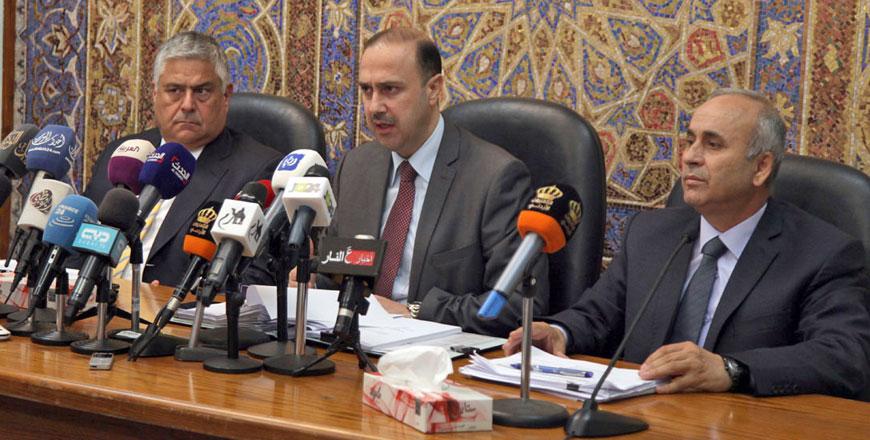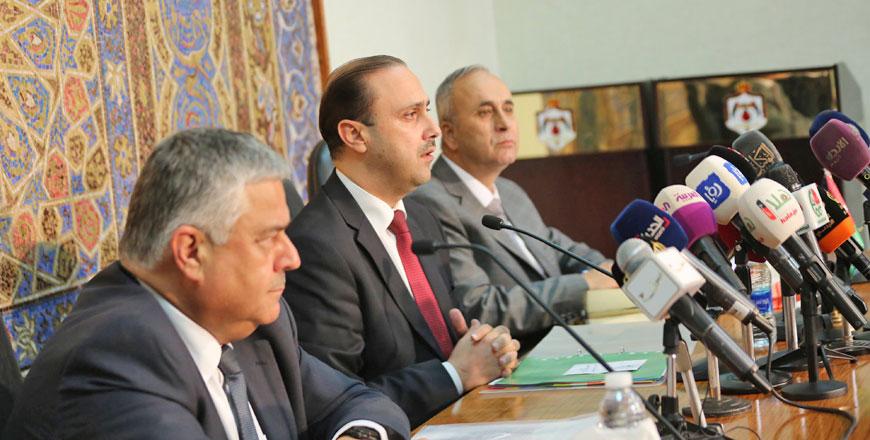You are here
Cabinet finalises income tax bill after ‘taking feedback into account’
By JT - May 22,2018 - Last updated at May 22,2018

Senior officials speak to the media during a press briefing at the Prime Ministry following a Cabinet meeting on Monday (Petra photo)
AMMAN — The government on Monday endorsed the income tax draft law and said it will refer it to the Lower House on Tuesday to get it through constitutional channels towards enactment.
Meanwhile, the government reasserted that it was earnestly carrying on with economic reforms according to schedule.
During a press conference at the Prime Ministry, part of which was attended by Prime Minister Hani Mulki, Minister of State for Media Affairs Mohammad Momani and Finance Minister Omar Malhas, joined by Income Sales and Tax Department Director General Hussam Abu Ali, detailed the changes introduced to the initial draft of the bill after it was put up for public debate for weeks, the Jordan News Agency, Petra, reported.
Mulki stressed that the dialogue over the key law would continue with lawmakers “to reach a just version that ensures success in combatting tax evasion and improve services offered to citizens”.
The proposed law is expected to be debated by the House after Ramadan during an extraordinary session, pending a decree by the King.
Momani said that the bill is part of a comprehensive economic and financial reform drive, reflecting policies that the government adopts to achieve self-reliance and build a strong economy that “strengthens political positions”.
“This is our message to the world: We are taking economic reforms seriously and carrying them out at the right pace,” he told reporters.
The minister made the remarks on the eve of an expected visit by International Monetary Fund (IMF) to review progress made under an economic correction plan.
The government has already made adjustments to the sales tax and subsidy system, an unpopular move officials have stressed is vital to salvage an economy that has been struggling amid regional instability, a huge refugee influx and dwindling international support.
Finance Minister Omar Malhas said that the bill mainly focuses on three aspects: improving tax collection, curbing tax evasion and boosting tax revenues, which are expected to increase by JD300 million annually.
Malhas noted that the past two weeks witnessed intensified consultations with all stakeholders to discuss relevant issues, adding that some 60 to 70 per cent of feedback given on the initial draft was taken into consideration when finalising the draft law.
For his part, Abu Ali said that the government accepted several suggestions it received on the bill, citing the example of levies on agricultural produce, which used to be imposed on sales, but were changed to only apply to profits.
The bill subjects capital profits to 15 per cent tax regardless of the sector.
The draft law also exempts venture capital funds, as defined under the Companies Law, from taxes so as to encourage the establishment of such funds to contribute to rescuing stumbling businesses.
Amendments to the law add the Jordan Integrity and Anti-Corruption Commission as one of the institutions that can look at data gathered by the tax investigation unit created under the bill.
As for confidentiality of bank accounts, the officials stressed that access to such data is only allowed by court order.
The bill distinguishes between intentional tax evasion and unintentional mistakes, stipulating that only the judiciary can indict suspects of tax evasion.
The bill re-labels tax evasion from a misdemeanour to a felony with harshened penalties of imprisonment and financial fines.
Related Articles
AMMAN — The government will use all its might to defend the income tax draft law as it is presented to the Lower House for approval, a gover
AMMAN — The Cabinet on Monday approved the mandating reasons for a draft law amending the Income Tax Law for 2018 and referred it to the Leg
AMMAN — Jordan’s income tax draft law will enable the Kingdom achieve a “positive credit rating” and enhance ongoing fiscal reforms in Jorda

















